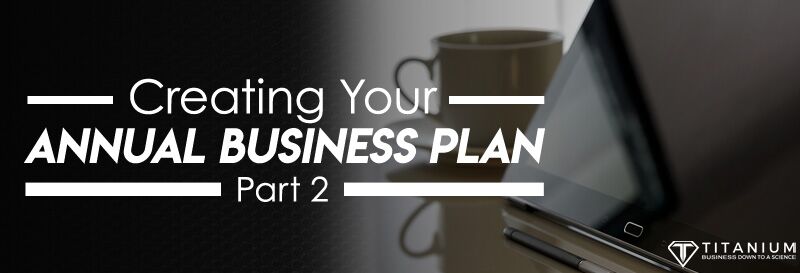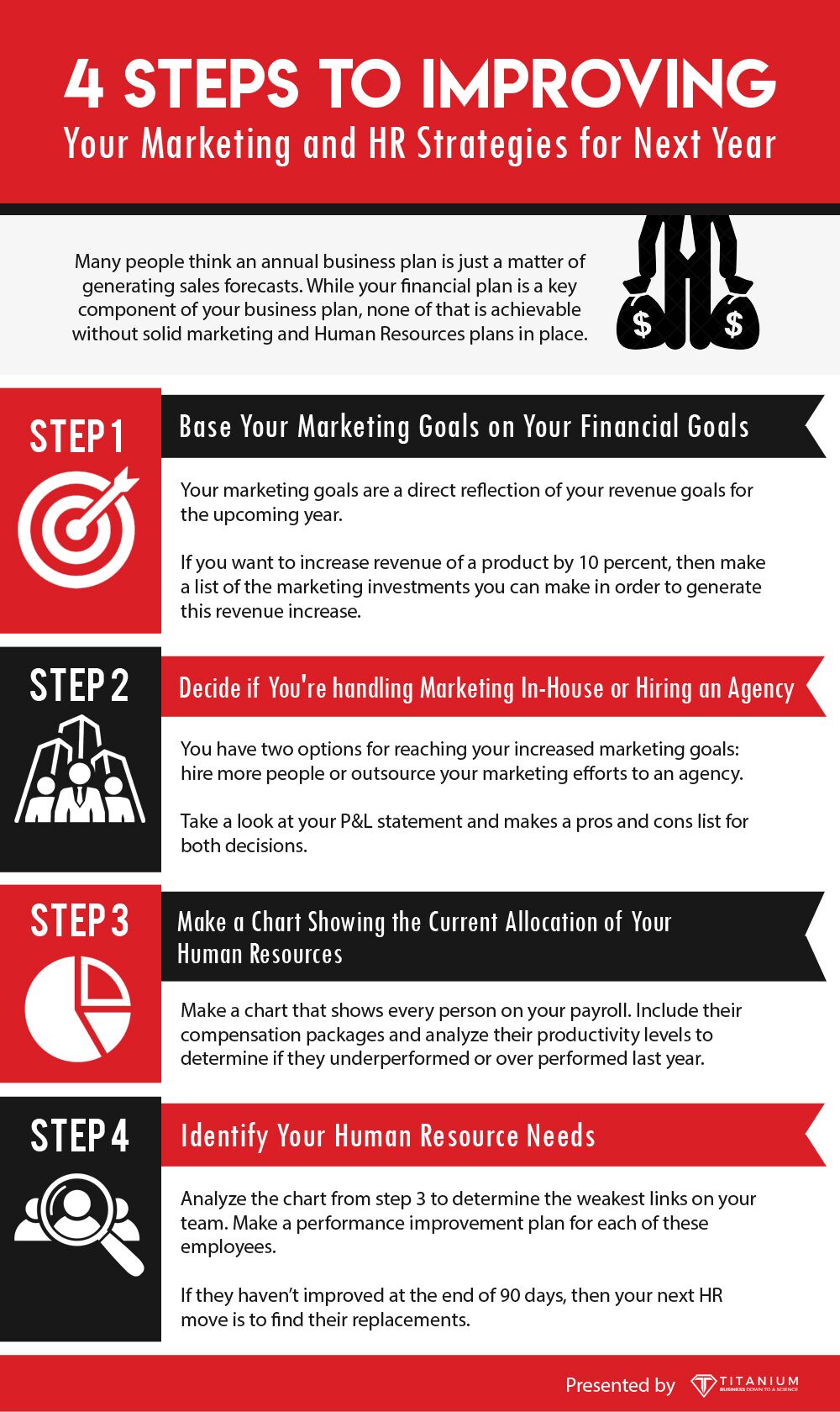Part 2 of Creating an Annual Business Plan
Today we’re picking up right where we left off last week and I’m going to explain to you the rest of what it takes to have an incredible business plan.
If you have not listened to the previous episode, please go listen to that first because this episode is simply a continuation of the last one, and the two together are going to allow you to create massive, massive systems in your business for ultimate success.
Every company needs a business plan, but what people think is that you create a business plan once and then never go back and look at it again.
No, you create a business plan, you then recreate your business plan once a year, and then you rethink and realign with your business plan once every quarter and then more often from there.
So now we understand that you figure out the finances, then you figure out the sales, and from there you start to figure out what it’s going to take to make those sales happen, and the first place we go is marketing, especially in this day and age when online marketing is such a huge component.
I mean, that’s why I went out and started my own digital marketing company doing online marketing, building websites, doing search engine optimization, doing ads and all that stuff.
Why Digital Marketing is So Important
I saw how this was such a massive part of the business world and so many of my clients were struggling massively with marketing. I saw that in my companies we were kicking butt with marketing, and so I decided a few years back to start this marketing company.
For three years I’ve had Titanium Marketing and we’re doing incredible things for our clients, including an email I just got from a client yesterday where this lady who’s in charge of the leads in this email is the most beautiful thing I could have read. She was sending an email to her boss and she says, “You know, in over three years of doing this, I had never once heard someone say, ‘I found you doing a Google search.’” She said, “Over the last month, I’m hearing that from people every single day.”
On this end, I’m getting teary-eyed, like oh my gosh, my team’s doing the job and these guys are paying a lot of money of course, so we’d better be getting them those results.
But see, that’s all marketing – getting the phone to ring. Sales is when you go out and you sell. But every once in a while, wouldn’t it be nice if your phone rang and someone was looking for your services?
So that’s where that part of it comes in. Then we’ve got to talk about human resources, and human resources in a company with people is people. You know, you’ve got to hire people, you’ve got to train people. Are they part-time or are they full-time? Do you need more people? Do you need less people?
But in a one-person company, which some of you may be, you are the human resource. What we need to do is take you and treat you like multiple people.

Creating a Plan for Human Resources
It’s interesting because in my Boot Camp seminars when I’m sitting there and taking people through the HR section, often it used to be that the one-person companies used to sort of start tuning out and going, “Well, I don’t need to worry about this part. This is the part where I can go grab a snack or I can use the restroom.”
I realized I would now stop them and say, “Wait, wait, wait, wait, wait! You need an organizational chart more than anybody else in this room, because you have no employees.
Meaning, you are the accountant, you are the marketing person, you are the salesperson. So now what you must do is you must schedule how many hours you’re going to wear each of these hats.”
I had a client once and I literally did this for him. This was a client who was incredibly smart, did really well in sales, and what I did was I literally had him create a hat.
We went online and ordered one for $16 or something that said “Sales” on it. I told him that every time he goes in to try to sell (and his sales was done in an office), I said, “I need you to put this hat on.” And then I had him clock in and out, so he literally became an employee.
We created this online thing and found this online program where an employee can clock in and out, and he clocked how much time he was spending doing sales. It was incredible for him to find just how little time he was actually selling. No wonder he couldn’t hit his targets.
I mean, how can you hit your sales targets if you’re constantly doing all this other stuff, right? And as he started clocking in and out, then what I did is I started having him clock in and out of different departments.
I was like, “Okay now clock in when you’re an accountant. Clock in when you’re this person, when you’re that person.” Then at the end of a week or month – now, he only did this exercise for a couple of months – but we found out what he was really spending his time doing.
It turns out he was spending most of his time just answering emails. When you go and look at the emails, what was he actually doing?
He wasn’t focused on anything. It was a little bit here, a little bit there, whatever. So again, human resources is for one-person companies, three-person companies, and massive 150, 200, 200,000-person companies.
Questions to Ask While Creating Your HR Plan
And then it’s about saying, “Okay, who do we need to hire and is their pay rate at the right level?” including, by the way, yourself.
Are these people getting paid the right amount?
Do they have the right training?
And what sorts of goals are they going to have? So who in my company is adding the most value and am I paying them fairly and what should I expect from them for the next year?
Then we go in and we literally create a plan for each of these areas for the individual people or the individual departments.
So in the biggest companies, like my largest companies, we talk about goals per department. In some of your businesses where you have small businesses that have under 20 employees, what we’re going to do is create a plan for what’s expected of each of those employees.
For those of you who have a one-person company, then what we’re going to do is create a plan for what’s expected on each individual part of you which is truly an employee of the company.
So now let’s think about where we’ve been. We’ve got the financials, we know where we’re headed, we talked about what sales it’s going to take to get there, what marketing plans it’s going to take to get there, and what human resources – people we need to get there, and what sorts of training and goals do they need for us to get there.
Planning out Your Projects
Next what we do is we plan out projects.
See, projects are where you realize there’s something in the company you want to do – something big. A project could be as simple as creating a new product, developing a new service.
So maybe the gentleman, Sherwin, who runs this podcast might decide next year he’s going to offer a service where for example not only does, he record podcasts, but then he creates an options for he says, “I’ll take your podcast and I’ll turn them into an audio program where you can sell a CD on your website.”
And as I’m saying this, Sherwin’s going, “Hm, why didn’t I think of this before?” Yes, that’s right. It’s a great idea, buddy. Do it!
So that becomes a project. Now his project is to develop this new stream. So what he’s going to have to do is go look into this. What does it take to edit podcast episodes for audio? You clearly have to get rid of all the references to podcasts and stuff like that. T
here might be some new audio to record. But most of the assets are there, right? Edit them, and then what does it take to burn these onto CDs thousands at a time, and then setting up a shopping cart on someone’s website. So all that stuff, all those details, become the project.
You can develop new systems, you can innovate/create new products and services. But notice how all of this goes all the way back up to the top where you decided what sorts of financials you were going to have next year. And as you make these decisions, now you realize okay, well I wanted to double my business and I thought I could just double my business by closing my eyes and saying, “I want to double my business… I will double my business… I will double my business.” Well guess what, friends? That doesn’t work.
Instead, you need a plan – an annual plan that guarantees that you’re going to double your business. And in the case of Apollo, Sherwin may decide that he can do this and then he’s going to create some projections and say, “Okay, if I do this, I think I could generate an extra $X in sales.” He then creates this project plan where he says, “Okay, for the first quarter, what I’m going to do is be in the development mode of this.
In the second quarter, I’m going to do this as a trial for three of my clients. Then in the third quarter I’m going to ramp it up and I’m going to sell it to everybody.
And then in the fourth quarter, I’m going to massively ramp this up.” See, now he has a plan. And guess what? Now he decides, “Do I need some people to be able to do this?” He might say, “Oh, yeah. I need someone who’s a specialist in X, Y, and Z,” so he plans to go hire that person.
Maybe not today but hire that person in June or July.
A
nd then he says, “Well, I need a marketing plan.” If you know anything about search engine optimization and online marketing, well then, he needs to start launching those websites today.
See how beautifully that works? He doesn’t even have the service yet, yet he might launch some webpages that talk about this service because by the time he wants to sell it in June, July, or August, he wants to make sure that he already has interest in this program.
Or what he might do is think about all this and go, “Okay, I’d better go talk to some of my clients and see if they see any value in this.” He might go back to them and talk to them about what the cost is that they would be willing to incur for something like this. See, all of that goes to planning.
That’s your projects – and you’re going to have all kinds of projects that you’re going to need to do. And projects, by the way, include for example if we’re going to move into a new office.
Are we going to take on any new things in the business?
Are we going to move to a smaller office?
Are we going to open additional facilities?
Are we going to franchise our business?
All those things are these little projects that you can consider running.

Next Comes Planning Your Investments
Next, what investments are we going to make? And in these next few areas, I’m going to go through them very quickly.
But what financial investments are we going to make? What investments of time are we going to make? That new building, that new office you move into, that’s an investment. But we think it through 100%. You wouldn’t believe how many of my clients – prior to becoming clients of mine, because after they would never make this mistake.
But they planned on moving offices and planned on the fact that their rent would double, for example.
But they didn’t bother to think about the furniture costs in that new offices or what happens when I go to that new office and my clients and my employees’ expectations change. In the new office, I now have a reception area in the front. Well guess what? I’ve got to make sure that I budget for a receptionist.
Now if I have a receptionist and I’ve got all this fancy stuff, I need to budget to have bottles of water up there. See, these are silly little things, but they matter in your business – trust me. These are the decisions you should be making every day and more importantly than ever, between Thanksgiving and Christmas you’ve got to sit down and plan for this for the next year.
Then, are you going to take any loans out? Borrowing money is not a bad thing. If you can borrow money, inject it into your business, and get multiples of that money, you’d be crazy not to borrow money.
So what kind of money are you going to borrow? Again, we’re not going to get that deep into this because in a future episode I will eventually talk about the best ways of borrowing money, SBA loans, and all of that stuff, because I’ve been there, I’ve been through it all for myself and with my business partners in the past.
With all my clients, we’ve worked through all this stuff.
Vendor Negotiations
The next area – we already talked about vendor renegotiations, where you go back to all your vendors and talking to them about pricing.
And let me take this opportunity right now to talk to my vendor for podcasting about my pricing for next year, right? I could say, “Hey Sherwin, you’ve been doing a wonderful job. Hey buddy, how about a 5% discount next year if I refer some people to you?” Or, “Hey, how about you give me more?” So I might go back to him and ask for a 5% discount next year.
But then again, maybe I go to him and I say, “Hey, how about I pay you the same amount and you give me a little bit more?” Or maybe I go to him and I negotiate a package that’s bigger – I promise him more episodes next year – but maybe I have him structure the pricing where maybe I pay less in the beginning of the year and more in the end of the year. See, what that does is it improves my cashflow position. Depending on his relationship with me, he may want to do that.
See, all these little things are the things that you need to be doing before the year starts. Not going through your year, constantly shooting from the hip and just reacting to the things around you, but you can go back to your vendors and I guarantee that you can renegotiate things, and especially for vendors where you do volume.
You can look at last year and say, “Hey look, we had this pricing, and this is the volume we did. What if I’m going to do twice as much volume with you next year? What pricing will you give me then?”
And often, just you talking about doing twice as much, they’ll be motivated to decrease your price and give you better terms – all of that stuff. So we renegotiate all of those things once a year.
An Exercise for Improving Vender Negotiation Skills
In fact, one of the things I like to do with my Boot Camp, and I do with my clients one-on-one is sometimes I’ll stop, and I’ll say, “Okay, let’s call one vendor and lower the price on one thing by at least $1 for next year.” It’s an incredible exercise to see how quickly and easily you can actually lower prices.
But that’s a part of your annual business plan for next year. Of course, once you come up with those savings, then you inject them into the top and now you’ve decreased your expenses and increased the bottom line of your company.
The Final Part of the Business Plan is Outsourcing
Then the next thing – and we’re getting to the end here – one other thing you do is you think about outsourcing. We live in a world today where if you are not outsourcing massive areas of your business, you’re missing out.
For example, I started outsourcing accounting in my companies about five years ago, and I never thought I could actually outsource accounting for my biggest company.
Believe it or not, today all of my accounting services are completely outsourced.
All we do in-house is essentially approve purchase orders and hit “print” to print checks. Everything else happens overseas at a fraction – I’m talking at 1/10th of the rate I would pay in the US.
And then of course I have a CFO who comes in from time to time and checks up on what we’re doing, but he’s a part-time CFO. So now I can afford to get myself a CFO that’s three, four, five times more qualified than who I would be able to hire full-time, but I only get him for a couple of hours a month.
And guess what? That’s all you need.
In most of your businesses, you may not even need that, so you outsource all of that stuff and it gets done correctly. Now in some cases, you have in-house people doing accounting. We can outsource them. In other cases, your in-house team needs help, so we outsource the help.
In other cases, you’re a one-person show and you’re doing your own accounting. Well, I can tell you what happens if you’re doing your own accounting – you’re not doing accounting, right? So we may incur some additional expenses but now we get proper accounting done for you.
Accounting is just one area you can outsource. There’s so many other areas of the business you can outsource. You’d be amazed what kinds of things you can outsource.
The admin work that you’re doing, we can find admin work for $2 to $3 an hour that is as high quality, if not higher, than what you can hire someone to do in the United States. We can take jobs that you may have to pay someone $12 or $13 an hour, and guess what?
They’re unhappy because they don’t want to make that little money. Instead, you outsource it and someone making $3.50 an hour appreciates the job more and you get better quality. Imagine stuff like that. So outsourcing is another big area.
Now You Need to Schedule Out Your Business Plan
And then we get to the final part, the end of all of this when you’ve done your annual plan is what? Scheduling. Because when you talk about something, it’s all wonderful and great. When you start to say, “Oh, well I want to plan it,” that’s good, too.
But see, it’s not real until you actually put it on a calendar. So before my coaching clients leave my boot camp, I have them pull out their calendar and ideally, I ask all my coaching clients to use Google Calendar or Outlook or some sort of an online calendar like that’s available everywhere and on all of your devices.
I have them actually schedule these things in. You schedule all of the quarterly stuff. You schedule the monthly stuff. You schedule in some of the daily stuff.
And when I say schedule it in, I don’t mean just say, “Oh, sometime in February we’re going to do this.” No, what I mean is you go in there and we say, “Okay, on April 11, 2017 we are going to do a financial analysis of the first quarter.” Now I say, “Okay, well then when do you need to have your financials ready by?” So we say, “You need them by the 8th of April.” So then we put another calendar invite for 8:00 a.m. to confirm that your finances are ready.
See, these kinds of things you can even preprogram emails – this is something I do for some of my clients is I teach them how to preprogram emails.
Would you believe you can go in and you can write a bunch of emails today and there are programs out there where you can schedule them to go out at a certain time?
You could write 12 emails – and by the way, you can just copy/paste this, and have those emails go out on the 27th of every month for the next year and have them go to your accounting person that says, “Hey, by the way, don’t forget to finalize my financials by this time.”
And then you could schedule another email that goes out on the 6th of the month that say, “Hey, are you almost done with this yet?” and another one that goes out by the 9th that said, “By the way, the deadline is tomorrow.”
I mean, imagine that level of organization. That’s what it takes to play at the highest level. That’s what it takes to get incredible success.
But scheduling it is much more than just emails and calendar stuff. It’s really figuring out when you’re going to have what, when you’re going to do what. We go back and now a month into it, you can say, “Hey, January is just finished. Am I on track to be a millionaire by the end of the year?”
Because if you wanted to be a millionaire and you were dead-set on it and you’re not on track, hey, we’ve just got to go back and change the plan and now you’re going to have to work a little bit harder. You’re going to have to try some new things.
What if by the end of March we see that for example for the gentleman who runs this podcast, he sees, “Wow, that whole idea of making these audio programs available, it’s just not going to work.” Maybe there isn’t enough demand for it. Maybe he can do it, but the cost is too high.
For whatever reason if he can’t do it, he can’t just say, “Oh, well forget it.” Hey, he wants to make a million dollars next year. So what he’s going to have to do is now say, “What will replace this and how will I do that in the next nine months?”
That, my friends, is what the most successful business people out there do and that is what you need to do.
So right now if you haven’t already done this, when you finish this podcast episode, I need you to go to your calendar and schedule in when you are going to spend two, three, four, or five days locked up in a room planning out your next year. If you do that, the last episode combined with this episode gives you most of what you need.
Now, the next few episodes we’re going to dig deeper into some of these areas including your finances, your marketing, and a couple of other things.
But it’s absolutely critical that you schedule this stuff in. Now if you’re coming to one of my Boot Camp episodes, depending on what country you live in, what city you’re in, and when you’re listening to this, go to our website. If you come to one of these Annual Review Boot Camps – I have all kinds of them, so make sure it’s the Business Annual Review Boot Camp.
That event, you can come, and you can get all this done guided by us with me and other people in the room who walk you through it. You walk out of that room with your blueprint set, so now it’s a matter of taking that blueprint and just following through with the things that are on there.
That’s my way of making sure people don’t walk out of the room with a bunch of extra homework. They walk out of the room and all they have to do is just follow through on the plan that they created.
So that’s what you need to be doing.
Schedule that in right now, whether it’s my event or your own time you’re going to go to a hotel, you’re going to fly to Hawaii – I don’t know what you’re going to do. Decide what you’re going to do, schedule it in, because until you schedule it in, it is not real my friends.
But on the other hand, once you schedule it in and you go through it, you spend those few days planning what you’re going to do next year after having reviewed what you did this year, the way that you feel inside is amazing. Because if you decided you want to make a million dollars next year, it feels as though you’ve already made it.
Why?
Because you now have a plan and your brain has this incredible way of seeing things that haven’t actually happened when it knows they’re going to happen, and it knows how it’s going to get there. So now you get the same joy and satisfaction and enjoyment you would if you already had that thing. So it’s like getting 12 months in advance and why not? Why not go through every day with that much energy and those positive, positive feelings inside.
Hey everybody, thank you for joining me.
I love you entrepreneurs and businesspeople out there who are going out every day and kicking butt. And by the way, if you don’t have a business yet, this step is the most important thing you can do, because every business should be started with a business plan that is exactly what I just described. I love you all and every day I want you to go out there, kick ass in your business, and always lead with your heart.




